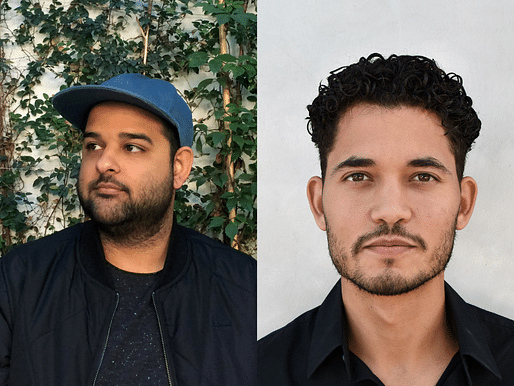

This post is brought to you by Tulane University School of Architecture, an Archinect Partner School
Tulane School of Architecture has selected designers and educators Omar Ali and Emmanuel Osorno to join the faculty as the school’s inaugural Architecture Fellows. As part of their two-year fellowships, they will also join the first cohort for the newly launched Deans’ Equity and Inclusion Initiative, a national partnership co-founded by Tulane School of Architecture. Ali, co-founder of table of co., will serve as the 2021-23 Architecture and Urbanism Fellow at Tulane. Osorno, founder of EOstudio, will serve as the 2021-23 Architecture and Social Innovation Fellow.
“Bringing new, diverse faculty with new perspectives to our school is incredibly important in advancing our own goals toward equity and inclusion. Both Omar and Emmanuel have immense talent, thoughtful teaching experience, and critical research in their fields, and our school looks forward to working with them,” said Iñaki Alday, Dean of Tulane School of Architecture.
During their two years at Tulane, Ali and Osorno will not only have teaching responsibilities but will also conduct research during their fellowships on a topic of their choosing, culminating in a presentation of their work in a public forum. They will attend two summer institutes hosted at different schools each year along with other fellows in their cohort from the Deans’ Initiative.
“The Tulane Architecture Fellows, together with the Dean’s Equity and Inclusion Initiative, is a significant step in diversifying educational institutions of architecture and the built environment,” said Edson Cabalfin, Associate Dean for Equity, Diversity, and Inclusion at Tulane School of Architecture. “We are truly excited that we are collaborating with this larger consortium of schools of architecture across the US that are committed to a more just, equitable, diverse, and inclusive built environment.”
Omar Ali is the co-founder of table of co., a cloud-based design and research practice. Ali’s research focuses on how liminal urban spaces, or “in-between” spaces like alleyways, can be leveraged to create a more equitable city. He has practiced architecture and urban design at UrbanLab in Chicago, MOS Architects in New York City, and John McMorrough / studioAPT in Ann Arbor. His work has been written about in Metropolis Magazine, published in Architecture and Surrealism (Thames and Hudson), Fresh Meat Journal (UIC), and LUNCH Journal (UVA). Over the last couple of years, he has exhibited at a83 Gallery in New York City, Banvard Gallery in Columbus, and has a forthcoming installation at Space p11 in Chicago. Awards include an honorable mention for the Burnham Prize Competition: Burnham 20/20, a finalist proposal for the 8x8x300 Competition, and was recently shortlisted for the 2021 Seoul Biennale of Architecture and Urbanism.
Ali holds a Master of Architecture from the University of Michigan, Taubman College of Architecture and Urban Planning and a Bachelor of Arts in Art and Architectural History from the University of Texas at Arlington. He has taught at design studios and representation seminars at Illinois Institute of Technology and the University of Texas at Arlington and was a Graduate Student Instructor (GSI) and a Graduate Student Research Assistant (GSRA) while attending the University of Michigan.
“My commitment to diversity, equity, and inclusion began from a young age, and I hope to continue on that path through this next stage of my career as an educator,” Ali said. “In my own research practice, we have self-initiated projects challenging the current inequitable state of the typical American city.”
Emmanuel Osorno is the founder of EOstudio. Osorno’s most recent work aims to recalibrate the public's view towards building preservation and social services, leveraging the power of images to infiltrate existing forms of media through which buildings circulate and gain value. While at Princeton University, he was a research assistant at the c.r.e.A.te Lab, where his work focused on computer vision and robotic operation; and he held teaching assistant positions for multiple design and social innovation studios. Prior to his graduate studies, Osorno practiced for several years at Eric Owen Moss Architects in Culver City, CA, where he was involved in the design and construction of renowned projects. His work has been published in ACADIA and Pidgin, and exhibited in San Francisco, San Luis Obispo, Chicago, and Princeton. He also contributed to the design and publication of the book L.A. [TEN]: Interviews on Los Angeles Architecture, 1970s-1990s edited by Stephen Phillips.
Osorno holds a Post Professional Master of Architecture and a Certificate in Media and Modernity from Princeton University, a Bachelor of Architecture from Cal Poly San Luis Obispo, and is a registered architect in the state of California.
“We all have a role to play in diversifying our discipline, and I am aware that mine is to keep learning, teaching, and mentoring,” Osorno said. “I want to help students gain confidence in their design skills and help them visualize that incremental change can have the impact that they desire to have in their society.”
Launched this summer, the cornerstone of the Deans’ Equity and Inclusion Initiative is a cohort-based fellowship program that supports early-career faculty who seek to engage in an academic career, while also contributing to the pursuit of equity and inclusion in the built environment. The program’s structure fosters a sharing of ideas and perspectives, as the fellows are selected to work in new academic settings with the nine partner schools and colleges.
For more information, visit architecture.tulane.edu and www.deansequityandinclusioninitiative.com.
No Comments
Block this user
Are you sure you want to block this user and hide all related comments throughout the site?
Archinect
This is your first comment on Archinect. Your comment will be visible once approved.